A few days ago I had the chance to visit a transit centre located in a former concert hall in Pavlohrad. Run by the Refugee Coordination Centre, it opened in early autumn 2024 and has to date processsed about ten thousand displaced people, including 1,300 children, mostly from Donetsk oblast (region).
Transit centres are part of a chain of NGOs and volunteer groups helping IDPs head west. Evacuators bring people from the danger zone to the centre, where they’re registered, given meals – I was told that one old man cried, because this was the first hot food he’d had in months – and can stay a few days if they want to before continuing west, to relatives if they are fortunate, or otherwise to hostels where they will hopefully receive some assistance to rebuild their lives.
Illia Novikov, head of RCC and a former smartphone salesman, gave me a lift from Dnipro to Pavlohrad and initially showed me around. You wouldn’t call the place pleasant, but nor was it dingy or suffused with misery like you might stereotypically expect a ‘transit centre’ to be. Refugees are by definition running from something terrible, but most of them are also trying to run to something good. Once you’ve decided, at last, to leave your home, it can be a kind of release, the same as any difficult decision. For some.
The main hall is full of camp beds, and there are a number of other services in the building: a medical room with a doctor for consultations, a children’s room full of toys, and a dining tent serving, on this occasion, a hearty borscht and rice with meat and vegetables. I think saw about 70 IDPs in or outside the centre, but when the Russians are advancing this can increase to 200 a day. There were many more staff than I had expected, either based at the centre or from international organisations such as Caritas, or locals like Skhid SOS, Eventroom and Base UA (Ukrainian charities providing evacuations amongst other services).
Plus one slightly confused but determined Westerner, wondering how to handle the kind of situation where I effectively turn up waving an iPhone and declaring, ‘Hello, unfortunate people! Please tell me about your current experience of destitution!’
So here are my encounters. People mostly did not want to be recorded, or I wasn’t sure they were fully able to give consent, but some were willing to speak.
An old lady who we’ll call Nastia (see pic above) was sitting on a bench in the middle of the registration room on her own, doing battle with a wet wipe in a tiny and intractable package. She appealed to me for aid and I successfully extracted the wipe. Grinning widely she produced a family-sized packet of miniature biscuits from somewhere and offered them to me. I attempted to politely take one, but of course a small deluge was poured into my hands. When will I learn that the less people have the more they want to give you? But was either accept the biscuits or let them fall to the floor.
Nastia was very old, very deaf and very cheerful. She’d arrived today and was hoping to head on to Lviv. I wished her luck.
Buoyed by an interaction conducted on a basis of equality and respect I went to the main hall, and approached an immaculately made up middle-aged woman sitting on a camp bed.
She was interested in what I was doing there. I explained about the blog, how I want to show people at home how things are on the ground, how we know there’s a war on but we don’t really understand what that means, etc. I have a routine now.
She accepted this and told me she and her adult son, who was lying on another camp bed beside her, turned away and concentrating on his phone, were from Kramatorsk city. “We got fed up of sitting in the corridor listening to missiles flying overhead, so we decided to leave.” The situation, she said, has got worse since autumn when I was there. “A lot of our friends stayed, though.” Did she know where she was going? “We’ll try Lviv and see what happens.”
She had a friend who’d gone to England. Did she want to go there? When I asked that, she passed the question on to her son, who finally roused from the game he was playing on his phone. ‘How?’ he said. ‘We don’t have any money.’ I explained that there are a lot of Ukrainians working in London, but admitted I don’t know how the system works for entering the country now. Less well than it once did, I suspect.
In any case, when you talk to a young man who isn’t obviously doing important civilian war work, a question appears in big red letters hovering over everyone’s heads: Why aren’t you in the army? You don’t have to be rude enough to actually ask the question for it to fill the air. Presumably he wouldn’t be able to leave the country if he tried, as men of fighting age aren’t allowed to. Or perhaps he was a little younger than he looked; men over 25 are subject to subscription.
When I failed to offer anything useful, he lay down again and went back to his phone, sealing himself off completely. Although all the IDPs coming through the centre were physically on their way somewhere, a few of them gave off a sense of having personally ground to a halt. Those few sitting or lying on camp beds, motionless and radiating an anger that seemed to make them twice their natural size.
Look, an old lady with a dog…! I have no interest in dogs. But you can pretend interest in a dog and its human can then choose to start talking to you or politely decline, as they wish.
It turned out that Maria was very happy to talk, and be photographed.
“I’m from a village near Pokrovsk,” she said. “I lived there for 50 years, mostly working in a kindergarten with the children.
A lot of people have stayed, but yesterday I decided to leave. People still hope, but it’s useless. You have to prepare for the worst. Good will come, anyway, but what if you expect everything to be good and it’s suddenly bad?
Though it’s a hard way to live. There I was, preparing for the worst, for winter, and then there was shelling. I thought, OK, I’m going to stay, though there’s no heating, no light, nothing. It’s winter and there will be nothing, no coal. And how to live then?”
I asked if there was no heating, though of course I knew the answer. She showed me a picture of a collapsed apartment block.
“The flats were destroyed. I left my flat before New Year and moved to a house where they gave us coal. But my neighbours stayed, during the frosts. I said, how can you live there? It was below zero, the water in the flat froze. And they’re old, 80.”
Another picture, of a block of flats with the side gaping open, wallpaper exposed.
“I said to this neighbour, can you leave? She said, I’ve nowhere to go. Now I don’t know if she’s alive, her window, her balcony was blown up. I’ve no way to find out. ”
And there’s no emergency services?
“No, no, nothing. I lived in that village for years, I thought I’d live out my days there. Then they destroyed it. It was a good life in Pokrovsk, I had my children there, I had a big kitchen garden with chickens and goats. That’s how it was, but it’s gone.”
Another photograph, of the house opposite hers: a pile of rubble. I asked where she was going, and it was the same place as everyone I talked to at the centre: “I’ve a sister in Russia, but it’s too far. I’m going to Lviv.”
Like Nastia, Maria was remarkably cheerful now her long-brewing decision had been made. Except when her voice broke and the tears welled up. Every time, she pushed them back within seconds. That containment was clearly important to her. Hopefully she can keep it up until she gets to Lviv and perhaps has the luxury of a privacy screen around her hostel bed.
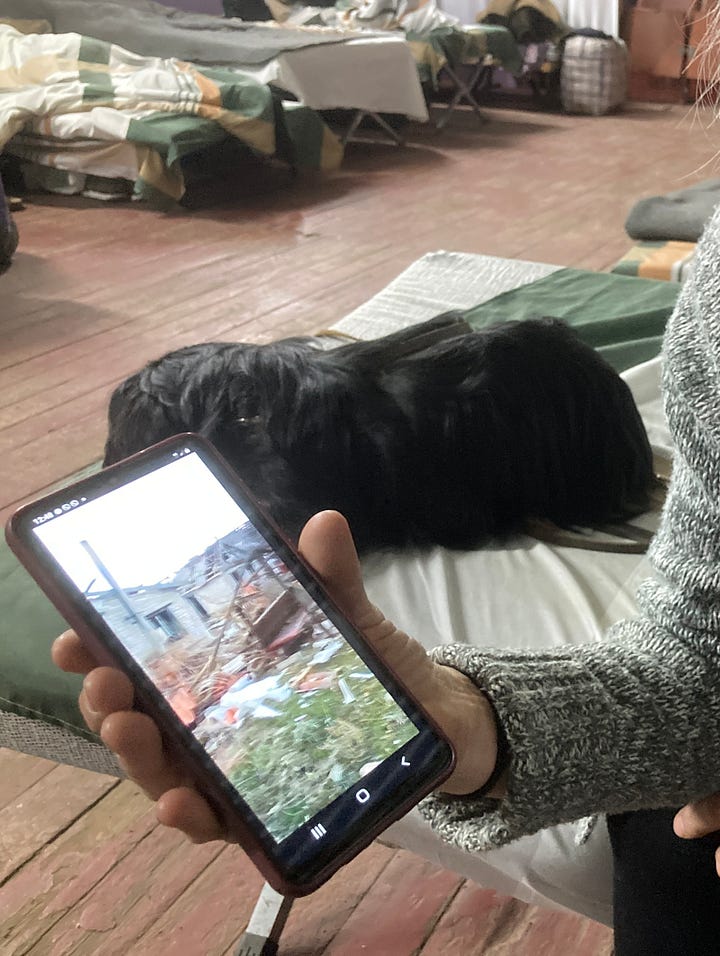
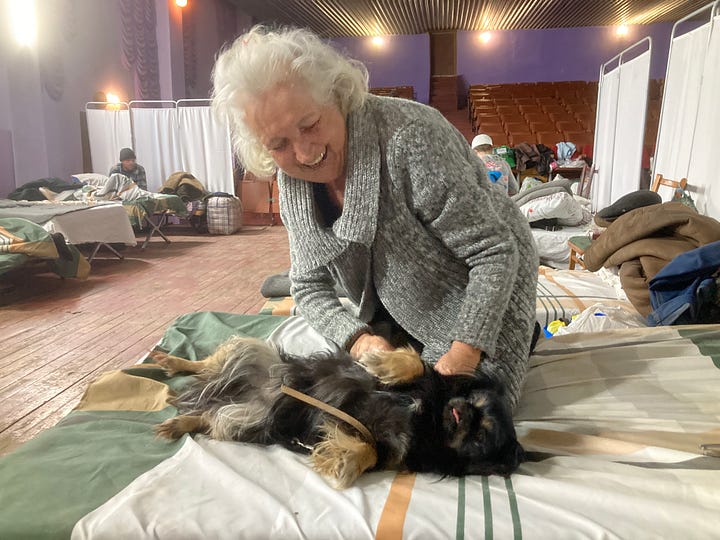
Then Maria got going on a second topic. “I could kill that Zelensky, you know. They’ve been negotiating for thirty days and there’s no peace yet!”
Ah. There’s a particular type of sweet old granny specific to Ukraine: the Zelensky-cidal. At least, unlike one of the residents at the Big Family shelter for elderly and disabled people in Kharkiv where I volunteered last year, Maria didn’t express a desire to crucify him. Some younger, more educated people dislike Zelensky too, saying that he failed to prepare Ukraine for war, but they mostly think it’s best to keep him as president at present for stability.
When I didn’t protest, Maria warmed up and continued, “All the politicians since Poroshenko are just after money. I don’t trust anyone any more. What do they think of Zelensky in Britain?”
I said a lot of people in the West admire Zelensky, because he represents Ukraine so well. This went down well with Maria, precisely because she didn’t agree and it opened up an opportunity for her to instruct me.
“You know, we lived well in Donbas until 2014. And then what happened?” She leaned forward, animated. “The Ukrainians attacked us.” I nodded non-commitally. “These days it’s hard to tell who’s attacking you, Ukraine or Russia, because it comes from both sides, but Putin wanted to protect Russian speakers in Donbas, he said on the television. So he sent troops.” I uh-huhed. Maria straightened up and looked around, speaking loudly. “Other people agree with me, but they don’t dare say it. I do.”
I looked around as well. There were only about half a dozen people in earshot, and they didn’t seem to be taking any notice, but I suspected they were. This was the first time I’ve heard someone openly praise Putin, and while I wasn’t about to tell a woman who’d lost her home in a war what to think about the sides involved, I wasn’t about to agree either. I nodded along to some more of the same, then made my excuses.
OK, the dog thing worked out! Let’s try that again…. The next old lady gave me the evils and snapped, ‘Do not approach!’ Oh well.
One of the staff instructed me to go and eat lunch. So I went to the food tent and sat where I was told to… And was immediately joined by deaf Nastia, ushered to her place by another kind but brisk staff member.
Nastia was no longer cheerful. In fact, she was almost shaking with outrage because, she said (shouted) there were no train tickets to Lviv available today. She was going to have to wait three days. Where’s the train station, she asked me, because she’d go there herself. I told her I didn’t know. The conversation devolved into one of the kind where the grandmother knows what she’s talking about, but I don’t know what she’s talking about, and neither she nor I know what I’m talking about.
A more connected grandpa intervened and explained to Nastia that she’d just have to stay for a while. He said he’d been here three days himself, and would be quite happy to go wherever they sent him, as long as he was with other Ukrainians.
Nastia stared at the tent wall for a long while then pushed away her lunch, complaining it would give her diarrhoea, and stomped off.
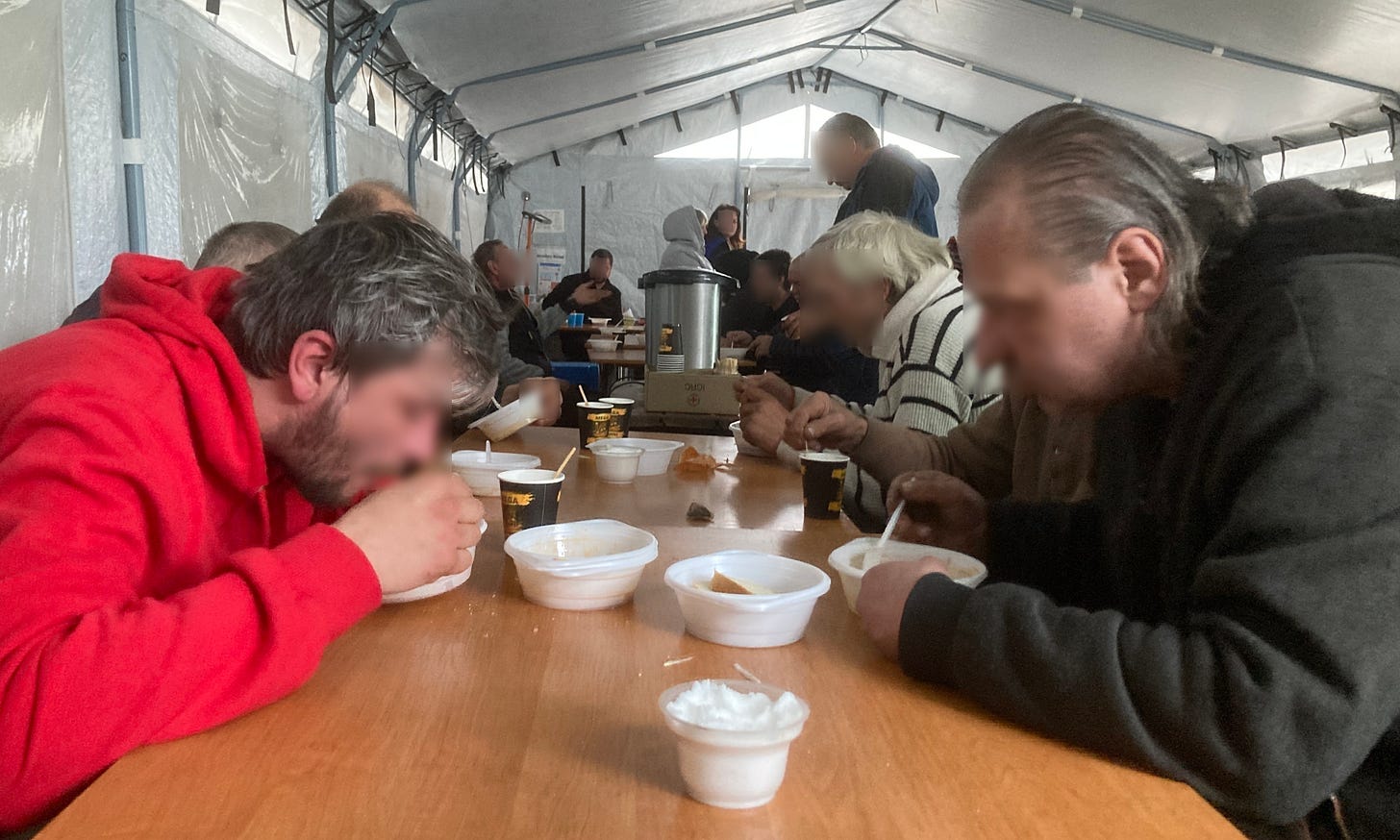
I finally took refuge from characterful old ladies in the corridor, where an RCC worker was explaining to a stout middle-aged couple their options for resettlement. Did they have anyone else with them? Yes, their young daughter was in another room. Did she have any needs? “She’s doing great. She just needs food and TikTok and she’s fine. But my dad—”
“Aha, you’re on your own out here!”
It was Maria. She continued, ‘When you left, a man came over to me and said he agreed with me. A lot of people do, but they’re afraid to say it.’
I’m sure that’s true, especially among the elderly.
Whatever their views are, people who pass through the transit centre receive the same attention and help. Maria went off to join the short queue for the desk where staff were handing out travel documents to Dnipro oblast residents on one side of the lobby, arrivals from Donetsk oblast on the other. For each one, a ticket, a letter with an official stamp and a wristband that was not quite green and not quite yellow.
In the car on the way back, I asked Illia about Maria and pro-Russian sentiment in general. He told me that a lot of older people who live in the east have been bombarded with Russian propaganda all their lives. “It’s a free country, they’re entitled to their opinion. She could go to Russia.”
I remembered what Maria had said about family. “She’s got a sister in Russia, but she says it’s too far to go there.”
“Ah. She has a choice, but she came here. She wants to live in Ukraine.'“
So it seems Maria knows in her heart who the good guys are here. May she and all IDPs find homes in western cities; and live long enough to vote against Zelensky at elections in a free and peaceful Ukraine.
Is the centre affected by the withdrawal of USAID? I think you can guess. It costs $7,000 a month to run and until February 60% of that came from US funds. There’s an article about the situation here.
I asked Illia if people can donate to RCC, but they don’t raise funds that way. However, Eventroom, one of the local Ukrainian volunteer groups that do evacuations to the Pavlohrad centre, are affected by the loss of funding for fuel. They accept donations via PayPal at kurdupovdmitriy@gmail.com and Revolut (EUR) at revolut.me/dmytropbrs.




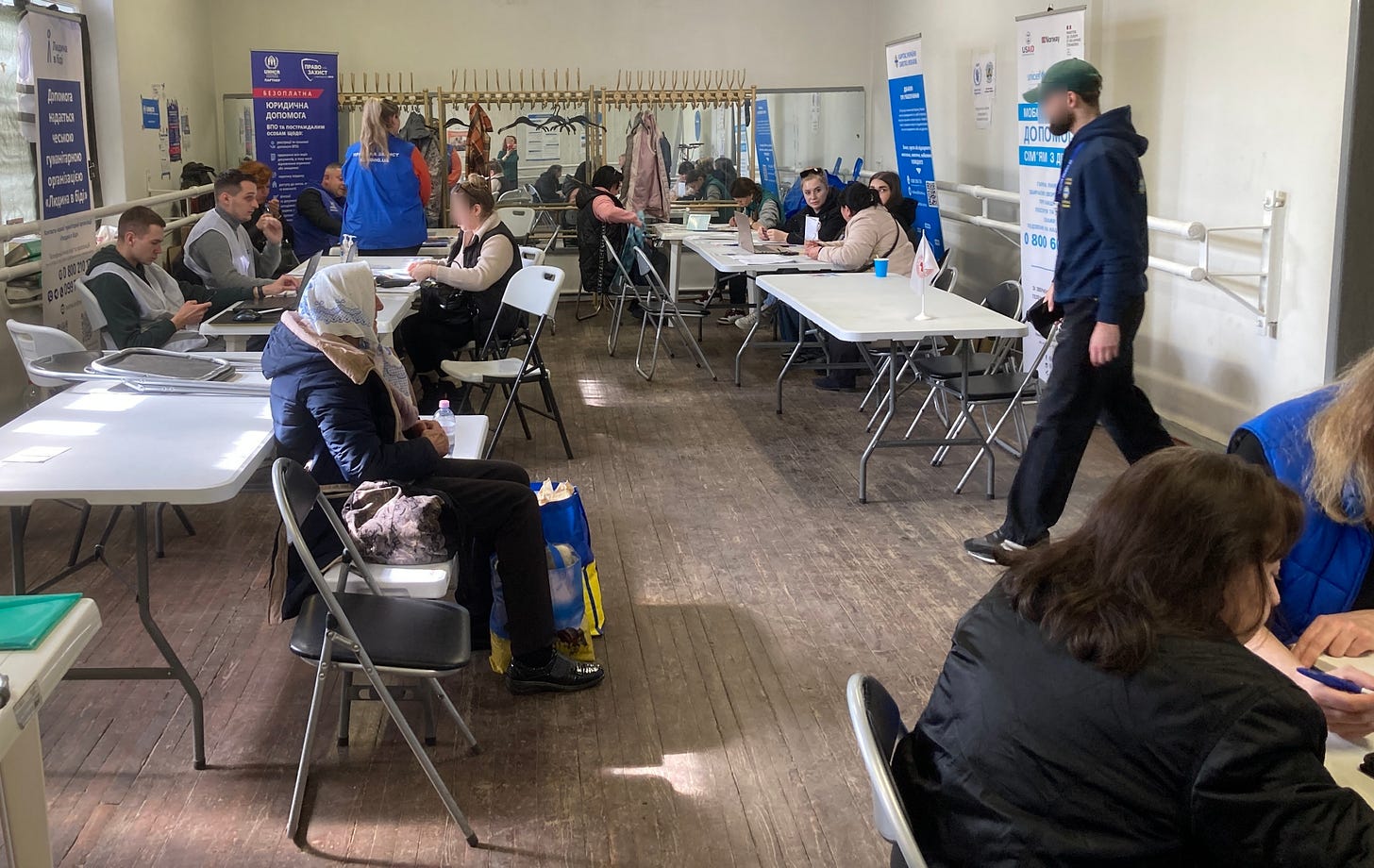
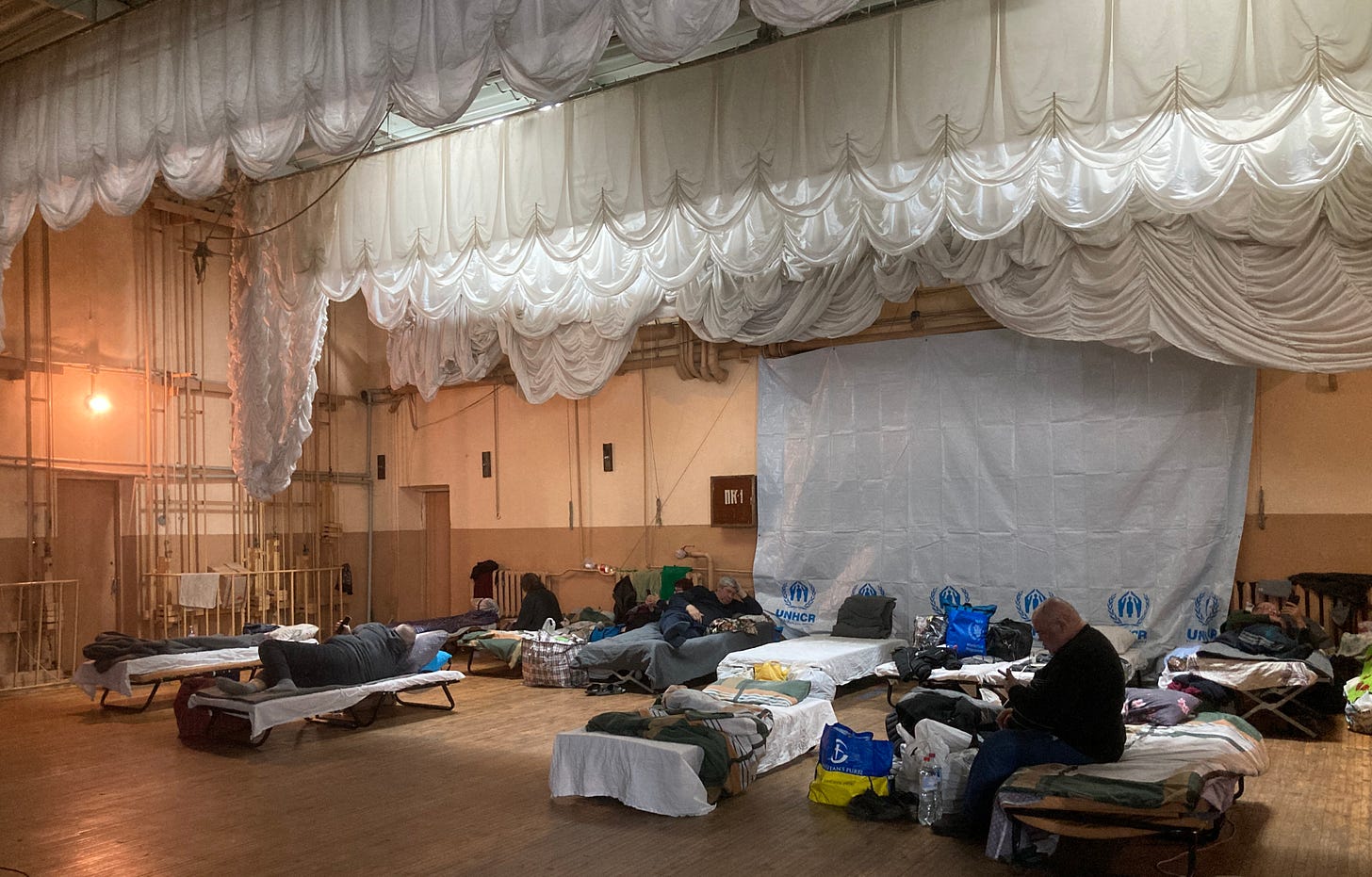
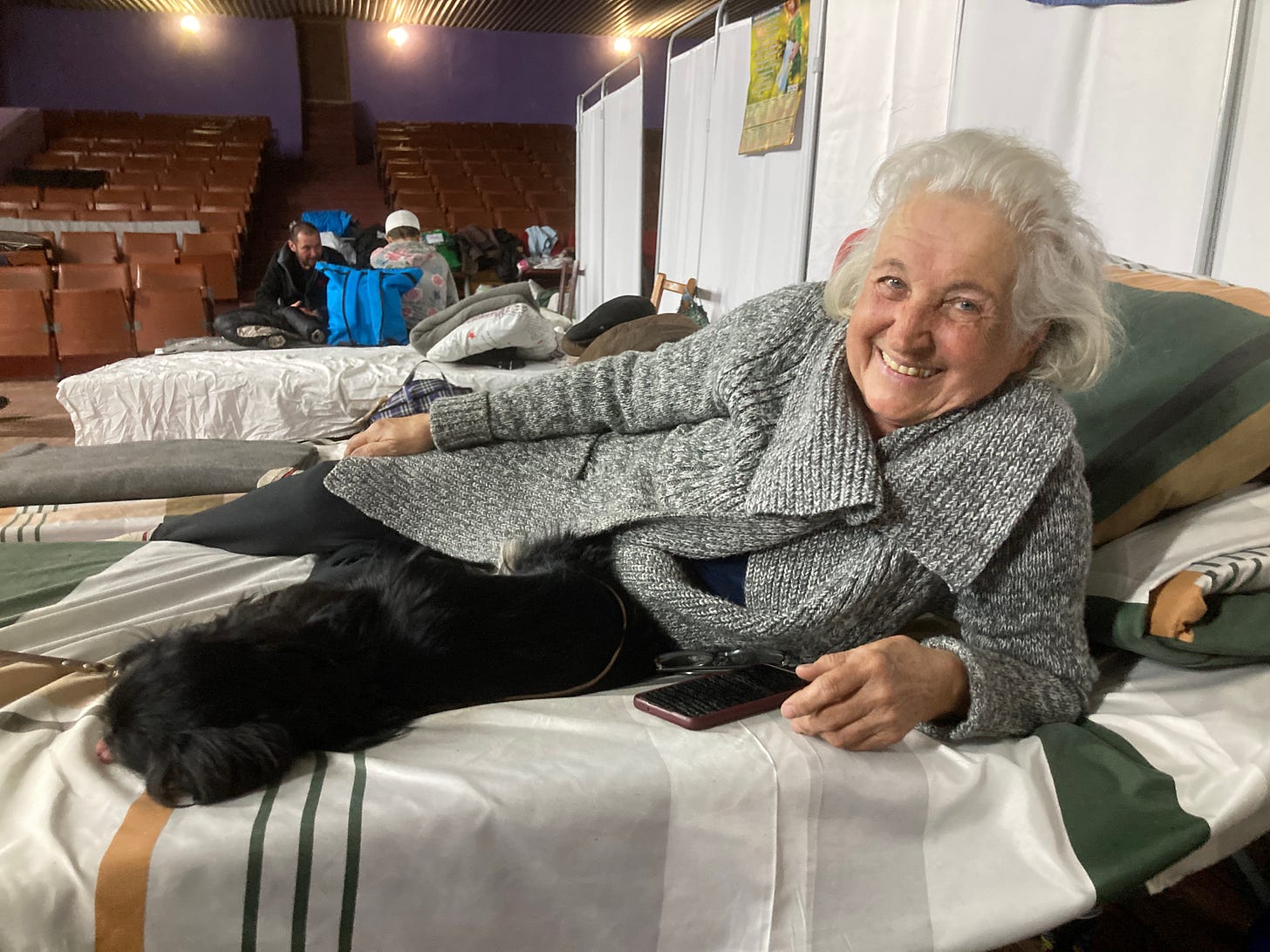
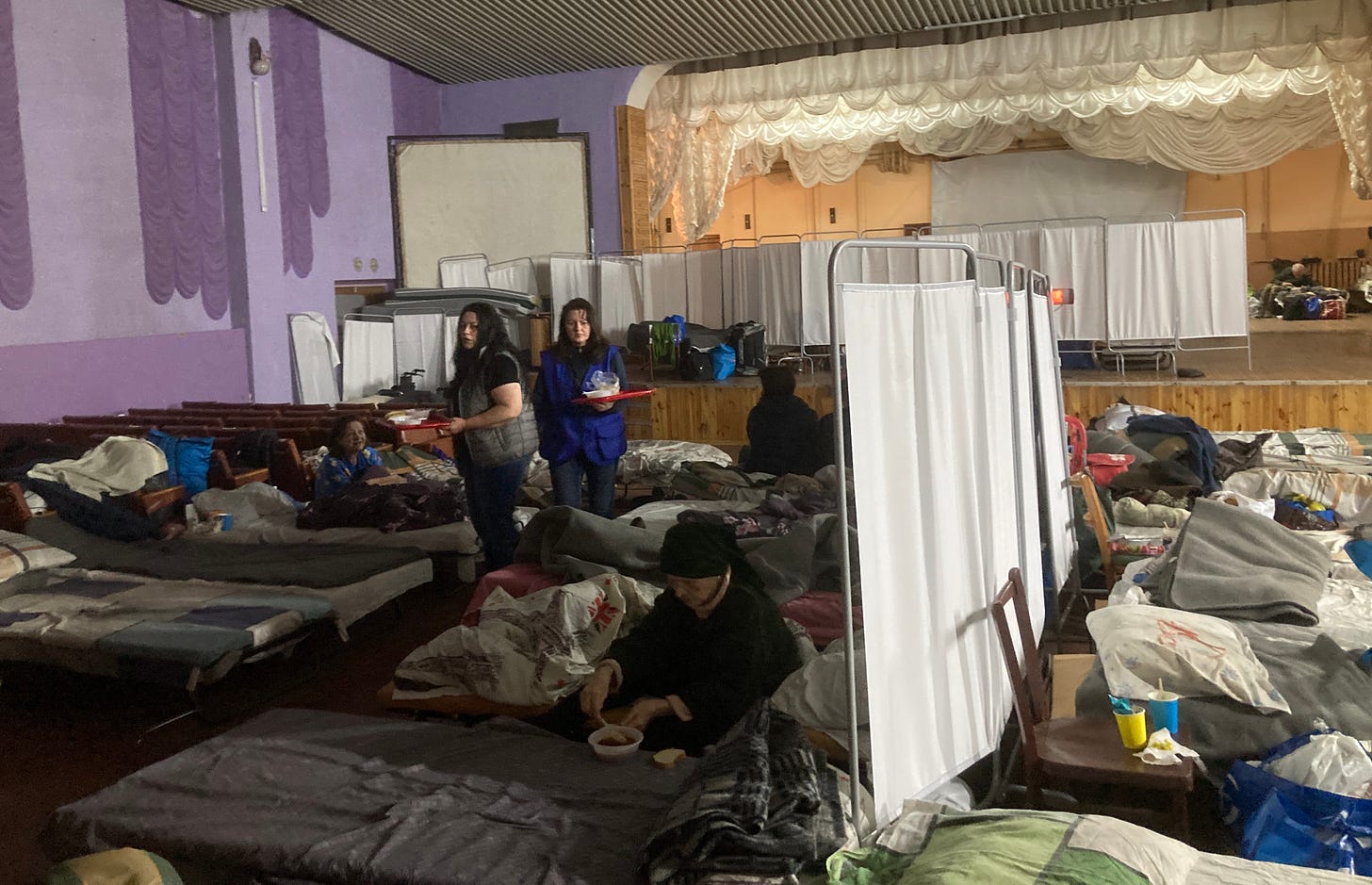
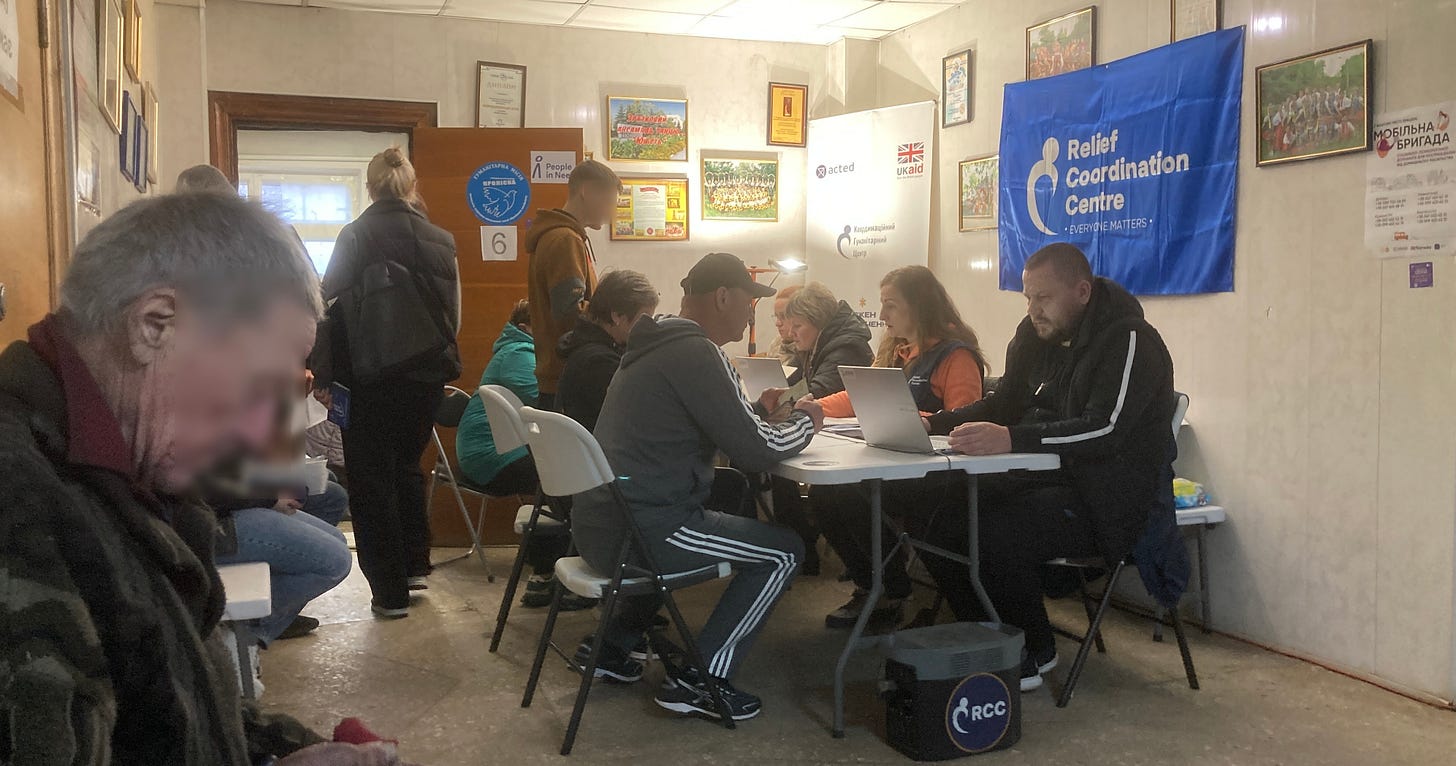
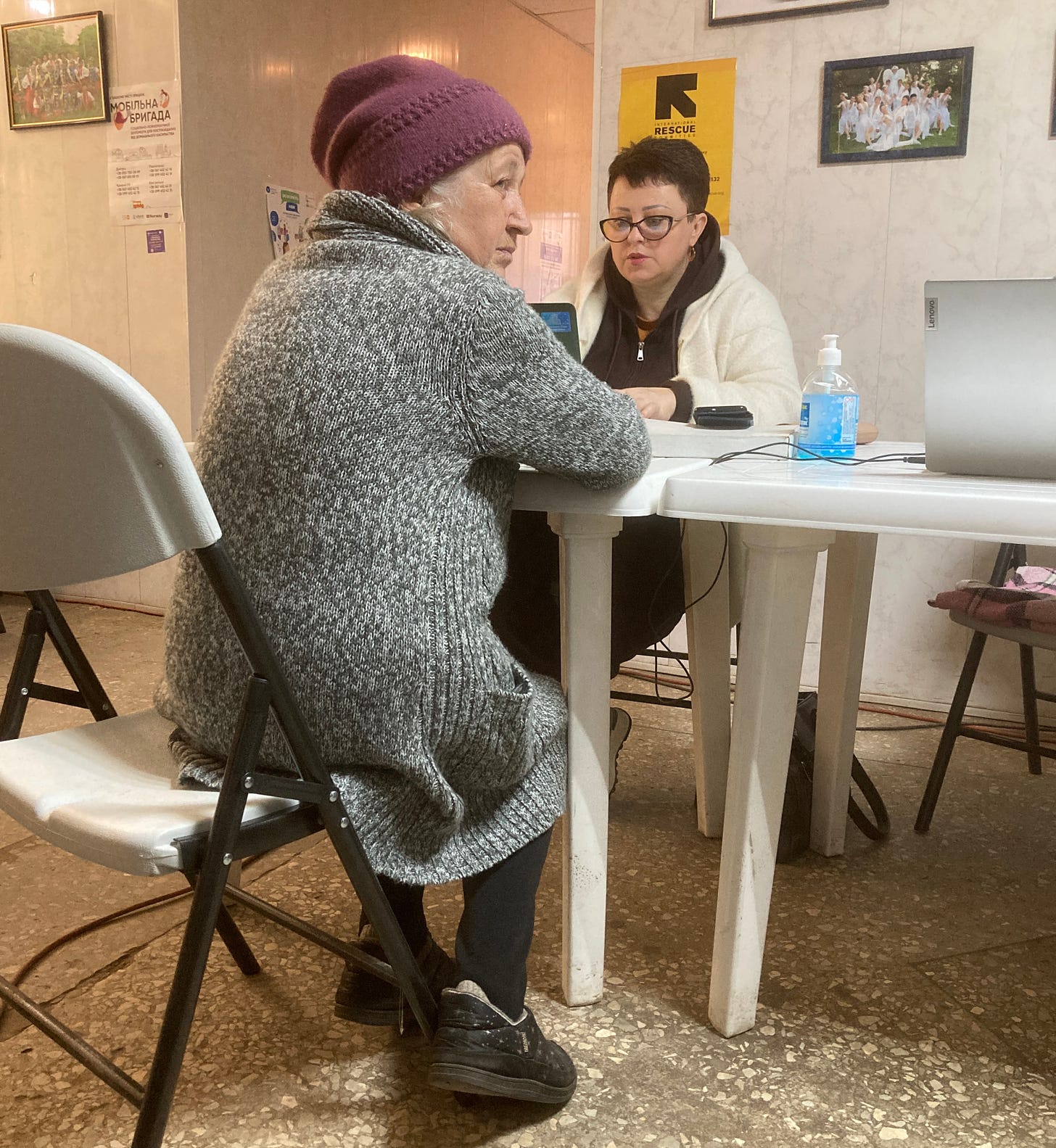
Here is another major thing I find horrible in a war: confusion. Not only a general lack of order and timely information, but also of a global view of the situation. I can understand how people try --as you rightly say-- to *make sense* out of the little bits and pieces of their personal experience. I can also understand how this contributes powerfully to the confusion!
Before recent events in the US, I would've asked Maria how she would explain Putin's blatant use of attacking civilian targets to promote terror but just recently read a quote by Dietrich Bonhoeffer about the futility of communicating anything to people who are locked into their world view. He called the phenomenon "stupidity". The quote is online and it starts like this "‘Stupidity is a more dangerous enemy of the good than malice." Maria is a classic example of what Bonhoeffer was describing in NAZI Germany. MAGA people in the US are the same in that they pick and choose which "facts" reinforce their worldview.
Excellent journalism, but I am frankly a little concern for your safety. You are an experienced traveler so I won't say more except I think you must have courage and that's something I wish more politicians would have more of.